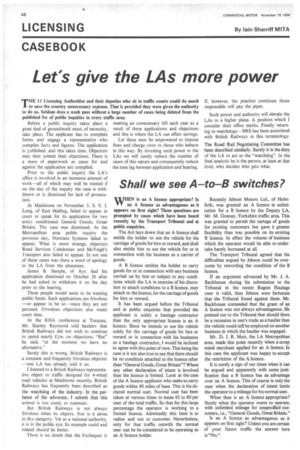LICENSING By lain Sherriff MITA
Page 48

If you've noticed an error in this article please click here to report it so we can fix it.
CASEBOOK
Let's give the LAs more power
PTHE 11 Licensing Authorities and their deputies who sit in traffic courts could do much to save the country unnecessary expense. That is provided they were given the authority to do so. Seldom does a week pass without a large number of cases being deleted from the published list of public inquiries in every traffic area.
Before a public inquiry takes place a great deal of groundwork must, of necessity, take place. The applicant has to complete forms and engage a representative who compiles facts and figures. The application is rublished, and this takes time. Objectors may then submit their objections. There is a mass of paperwork as cases for and against the application are compiled.
Prior to the public inquiry the LA's office is involved in an immense amount of work—all of which may well be wasted if on the day of the inquiry the case is withdrawn or is dismissed for lack of prosecution.
At Maidstone on November 3, S. E. 1. Long, of East Mailing, failed to appear in court to speak for its application for two artics conditioned General Goods, Great Britain. The case was dismissed. At the Metropolitan area public inquiry the previous .day, Nortrans Systems failed to appear. What is more strange, objectors Road Services Caledonian and McVeigh's Transport also failed to appear. In not one of these cases was there a word of apology to the LA from the absentees.
James B. Semple, of Ayr, had his application dismissed on October 26 after he had asked to withdraw it on the day prior to the hearing.
These people would seem to be wasting public funds. Such applications are frivolous —or appear to be so—since they are not pursued. Frivolous objections also waste court time.
At the RHA conference at Torquay, Mr. Stanley Raymond told hauliers that British Railways did not wish to continue to spend nearly on objections. "But" he said, "at the moment we have no alternative."
Surely this is wrong. British Railways is a constant and frequently frivolous objector —one LA has already told it so.
listened to a British Railways representative object to traffic designed for 4-wheel road vehicles at Maidstone recently. British Railways has frequently been described as the watchdog of the industry. In the parlance of the advocate, I submit that this animal is too costly to maintain.
But British Railways is not always frivolous when its objects. Nor is it alone in th s category. Yet as a national authority. it is in the public eye. Its example could and indeed should be better.
There is no doubt that the Exchequer is meeting an unnecessary bill each year as a result of these applications and objections and this is where the LA can effect savings.
Let these men be empowered to impose fines and charge costs to those who behave in this way. By investing such power in the LAs we will surely reduce the number of cases of this nature and consequently reduce the time lag between application and hearing. If, however, the practice continues those responsible will pay the piper.
Such power and authority will elevate the LAs to a higher plane. A position which I consider their office merits. Finally returning to watchdogs—BRS has been associated with British Railways in this terminology.
The Road Rail Negotiating Committee has been described similarly. Surely it is the duty of the LA to act as the "watchdog". In the final analysis he is the person, at least at that level, who decides who gets what.




































































































































